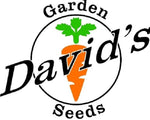Broccoli Waltham 4 Non-GMO, Heriloom Seed Sizes Available
Grow a versatile and flavorful classic with Broccoli Waltham 29! Developed by the University of Massachusetts in the 1950s, this adaptable heirloom broccoli thrives in both spring and fall plantings. Known for its delicious taste and beautiful dark green to bluish heads, Waltham 29 is a reliable choice for home gardeners and small farms alike. This proven variety produces medium to large heads with excellent side shoot development, extending your harvest season well beyond the primary cut. The plants demonstrate strong disease resistance and consistent performance across diverse growing conditions, making them forgiving for both experienced growers and beginners. Waltham 29's cold tolerance allows for late-season harvests, while its heat resilience supports spring production in warmer climates. Whether you're planning succession plantings for continuous supply or maximizing yield from limited garden space, this dependable cultivar delivers quality heads with superior flavor that outperforms many modern hybrids.
Why Choose Broccoli Waltham 29?
- Adaptable Growth: Perfect for spring and fall plantings in a variety of climates.
- Rich Flavor: Enjoy a delicious, mild taste that works well in salads, stir-fries, and soups.
- Heirloom Quality: Open-pollinated seeds ensure consistent growth and flavor year after year.
- Sustainable Packaging: Non-GMO seeds in environmentally friendly, recyclable packaging.
Planting Tips for Success
- Sunlight: Prefers full sun but tolerates partial shade in warmer climates.
- Soil: Thrives in nutrient-rich, well-drained soil with a pH of 6.0–7.0.
- Planting: Sow seeds directly into the soil or start indoors for an early harvest.
- Spacing: Space plants 18–24 inches apart for proper growth.
- Watering: Keep soil consistently moist but avoid over watering.
- Harvesting: Ready to harvest in about 50 days for tender, flavorful heads.
Why Choose David’s Garden Seeds®?
- Veteran-Owned: Supplying premium seeds since 2009.
- GO TEXAN Certified: Supporting local agriculture and communities.
- Heirloom & Open-Pollinated: Passed down for over 75 years, ensuring quality and natural reproduction.
- Freshly Packed: Prepared for the current growing season with high germination rates.
Order Waltham Broccoli Seeds Today
Order today and grow your own fresh Broccoli in your spring & fall gardens.


